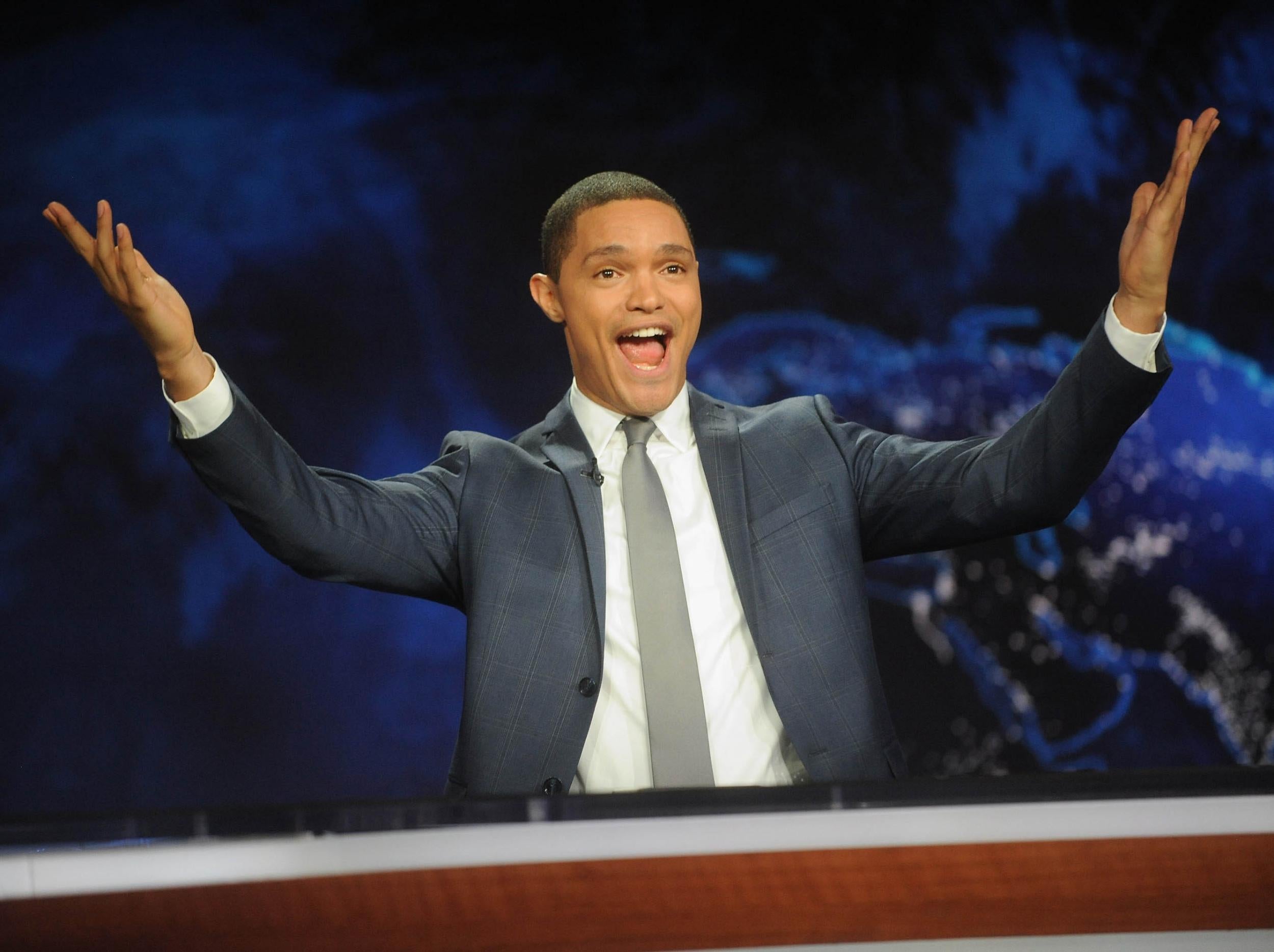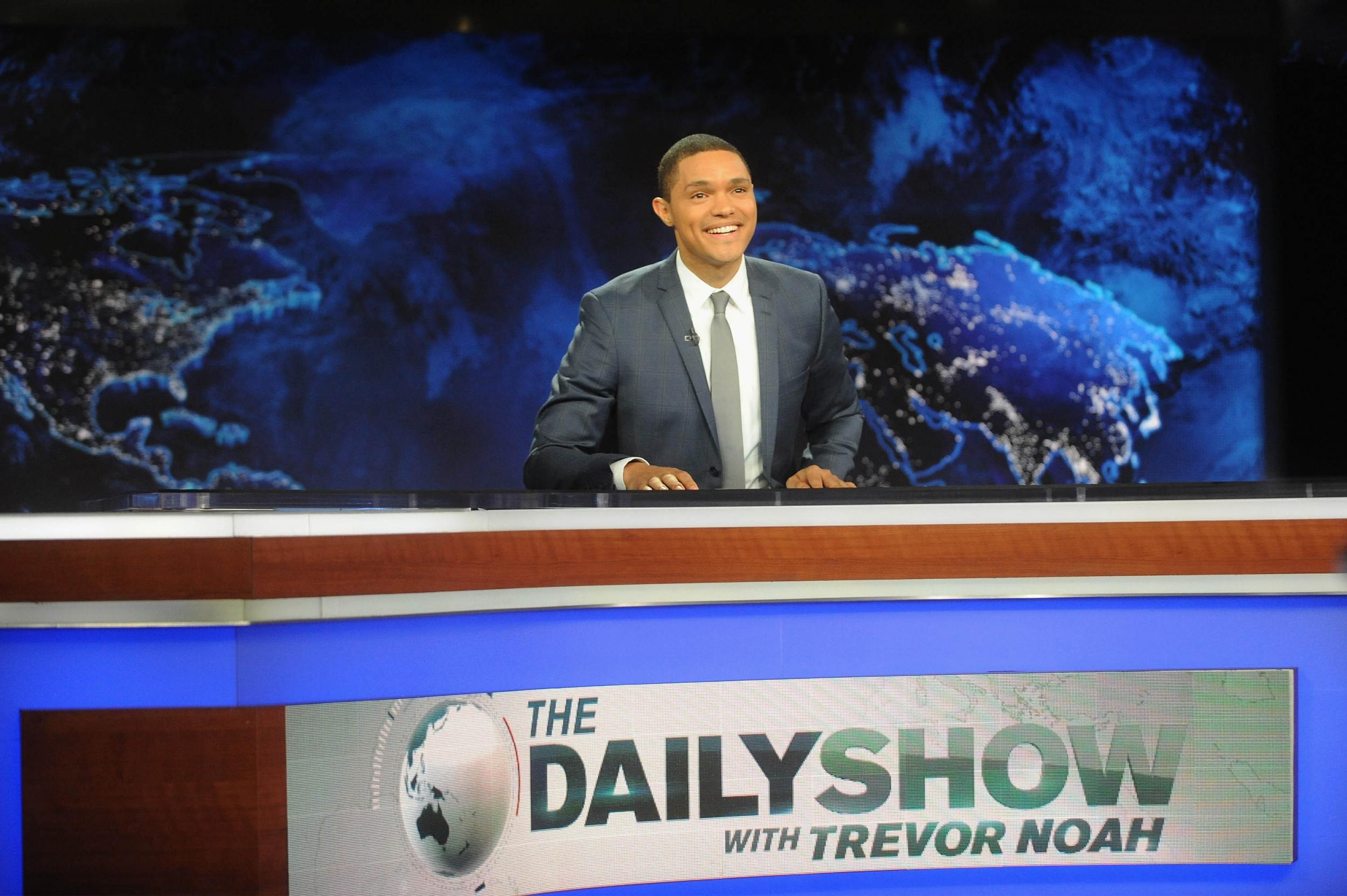The Daily Show’s Trevor Noah on being the new Jon Stewart: 'People have a right to not like me'
One month into his new job as the host of ‘The Daily Show’, stand-up Trevor Noah talks to Tom Teodorczuk about not being a politics junkie, ignoring his critics and how Nelson Mandela taught him to crack jokes

Trevor Noah, the South African comedian who recently replaced Jon Stewart as presenter of The Daily Show, is a huge fan of football. “I love the game so much,” he tells me. But asking him who he supports elicits an unusual response. “I have no team that I support. I’ve never fundamentally understood that concept because I fall in love with players and then they leave and I’m still now meant to be indebted to the team? That doesn’t make sense because the players are the team. Where Zinedine Zidane went, I followed him. Where Thierry Henry went, I followed him. I’m loving [Anthony] Martial at Manchester United, I still love Luis Suarez regardless of everything. Sometimes people lose out because they’re so focused on hating the opposing team that they forget to enjoy and applaud the beauty and spectacle of the game.”
Noah’s approach to the beautiful game is illuminating since it illustrates both his dislike of partisanship and his optimistic outlook. These factors account for his swift rise to television stardom but they also ensured that his appointment as Stewart’s successor on Comedy Central’s hugely popular current affairs satire took the US media establishment by surprise.
When we meet at Comedy Central’s studio in Midtown Manhattan, Noah is buzzing with enthusiasm and confidence but he admits to being nervous about his new role. To be sure, at 31 he commands a significant following as a stand-up comedian and is hardly a stranger to American TV screens (or indeed British ones as viewers of QI and 8 Out of 10 Cats know well); and he possesses TV credentials, having been the first South African comic to appear on Jay Leno and David Letterman’s shows. But the appointment signified a bold change of direction on Comedy Central’s part. Quite apart from not being a white American, Noah, unlike Stewart, doesn’t revel in being a political obsessive. Indeed, watching him at work, Noah’s political take reminds me of Tom Stoppard ‘s celebrated riposte in a job interview with a Fleet Street newspaper editor who had asked him to name the Home Secretary: “I said I was interested in politics, not obsessed by them.” Noah later tells me, “I don’t consider myself a political junkie but I consider myself an information junkie, whether it’s technology, sports, entertainment or politics.”

Since taking over the reins of The Daily Show, Noah has certainly got up to speed on the Presidential race, comparing Donald Trump to an African dictator, interviewing Chris Christie and highlighting Ben Carson’s zombie-like tendencies. But while Stewart revelled in meticulous political portraiture – to the extent that his tenure was dominated by speculation that he would himself run for public office – Noah delights in working from a blank canvas.
He identifies himself as a progressive but not a political progressive and has little time for conventional beltway banter: “I find it funny all over the world that we’ve created this thing where politics is somehow exclusive, reserved for the political elite.” In America specifically, he says, “The problem is they’re so quick to jump to ‘What it means!’ ‘This is what they said! The soundbite!’ that you start to lose context and lose the real conversation you should be having.”
Under Noah, The Daily Show is focusing more on pop culture – and will feature more music – but in a way, he maintains, that maps to society. “Look at an argument between Taylor Swift and Nicki Minaj,” he says. “When you get to the core of that argument, you realise racial undertones, you realise the society we’re living in, you realise women’s issues come to the fore.” If it was a website, his vision for The Daily Show would be more Friends Reunited than Politico. “The show is a friend,” he says. “Some people will like it and some people won’t. That’s what friends are, people that we like. Everyone else we don’t like. It doesn’t mean that we hate them; we just choose not to be with them. I want the show to be a natural place where we can engage in honest conversations and learn about one another in our friendships.”
Noah could do with a few more friends at the moment. The ratings for the month he’s been presenting the show are down a third on Stewart’s tenure and this during the height of US presidential election campaign season. He is unfazed. “I can never be in control of how much people appreciate me,” he insists. “The only things I can control is how hard I work, how honest I am and how much I put myself out there. I would hope that people would appreciate that as they have with stand-up comedy and everything else I’ve done. When Jon Stewart started, nobody knew [who he was]. Now I’m starting, nobody knows. People have a right to not like me and people have a right to like me but at the same time I want to be enjoying it as much as possible.”
Having moved to the US in 2011, Noah now lives in the Upper West Side with his model girlfriend Jordyn Taylor. It’s a far cry from his upbringing in Johannesburg, the son of a mixed race couple at a time when interracial unions were barred in South Africa. His mother is of mixed Xhosa and Jewish heritage while his father is a white Swiss-German. It was a far from carefree childhood: his mother was jailed and fined by the South African government and his father moved back to Switzerland.
Yet Noah tells me that the struggle to end apartheid helped to shape his sunny outlook and sharpened his sense of humour. “I’ve read articles about myself where they say, ‘Trevor is overly simplistic and optimistic in his views,’” he says. “Maybe I am, because I come from a place where the impossible was achieved. You could not have a bloodless revolution, you could never have the people that were instrumental in the oppressing and the torture and the killing of black people now be forgiven and be part of the community.” He even says that South Africa’s greatest modern statesman epitomised his comic philosophy: “Nelson Mandela would tell so many jokes but sometimes I’d see him at a press conference and he’d tell jokes and nobody would laugh because it was Nelson Mandela. How could he after 27 years in jail? I think he realised, why not make a few jokes because in the end that’s all you have.
“My best friend’s grandmother passed away three days ago and within three minutes of getting the news, we made a joke because that’s how we deal with pain. If you can’t laugh, you’ll want to cry forever. It doesn’t mean you dismiss what has happened or you trivialise the information but you find a way to process the information and work through it. That’s something I learned in my family and in my country.”
Noah began his career on a radio show called Noah’s Ark on a youth radio station in Johannesburg. He first came to prominence in the UK with The Racist, his debut stand-up show at the Edinburgh Fringe in 2012, which was produced by Eddie Izzard. His stand-up routines translated easily to television and Noah was hired by Comedy Central after he impressed them with appearances on late-night talk shows and his guest contributions on The Daily Show towards the end of the Stewart era.
He still performs live, though he was recently caught up in a plagiarism row over using a near-identical line about being a ‘racism connoisseur’ from Dave Chappelle – who happens to be one of his idols – at an LA event. Lost in Translation, the show he performed at the Edinburgh Fringe in August, will return to London’s Hammersmith Apollo at the end of the year. A wide-ranging hour, it covers Cecil the Lion, Ferguson and Idris Elba playing James Bond, among other hot topics.
He is used to controversy. Upon the announcement that he would take over The Daily Show, Noah was heavily criticised for some of his earlier anti-Semitic and misogynistic tweets. “What I’ve learned in comedy is you go, ‘If it doesn’t work, what was I trying to say?’, he says. “‘How could I have said that better?’ Then you start to realise that when you’re lazy with it which I often am/ was on Twitter, it’s because it was this random thing where we wrote whatever we wanted. You start to realise there are ways you have to focus on getting to the heart of the issue. When it comes to, say, insulting Islam, I often ask why? What is your purpose? Just to do it and provoke somebody?
“Within the world of comedy and free speech there is hate speech and you must always be careful not to stumble into that realm. That is something that I am cognisant of. I’m not saying I’ll never make a mistake but you have to think, ‘What am I trying to say?’ There shouldn’t be any taboos but you should ask yourself, what I am trying to achieve with this joke? That’s when you’ll start to see for yourself whether you could use the joke in a different way to make things better.”
Noah goes on to confront one of the thorniest questions in comedy circles – where the boundaries lie in causing offence and flouting political correctness.
“The hardest thing to understand is how loaded everything is at the moment,” he says. “Everything you say can and will be used against you and that’s what I’m learning every single day. Unfortunately what that creates… Well, let me say the fortunate side is it creates a space where we think before we speak,” he says, thinking carefully about what he is saying.
“What’s unfortunate is it also creates a space where people are afraid to broach any topic or any subject for fear of being engulfed by the masses on either side… People are so afraid that they end up not saying anything at all.”
‘The Daily Show’ with Trevor Noah airs weekdays at 11PM on Comedy Central; ‘Lost in Translation’ is at the Apollo Hammersmith, 21, 22 December
Join our commenting forum
Join thought-provoking conversations, follow other Independent readers and see their replies
Comments
Bookmark popover
Removed from bookmarks